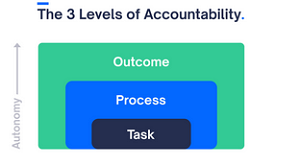More On Accountability
Introduction
Accountability has been defined as the obligation or willingness to accept personal responsibility for one's actions and words. It is more than making and keeping your commitments - it is about transparency, sharing, etc. For example, owning your mistakes, failures, etc:
"...accountability fosters better working relationships, improved job satisfaction, and helps teams work more effectively together......eliminates surprises and improves overall job happiness..."
Range, 2023
With accountability, people know that they can count on each other to get things done; encourages people to exceed their goals and improve their performance.
Accountability is linked with autonomy:
"...Unearned autonomy with no accountability can lead to disorder, discomfort, and dissatisfying results. On the other hand, too much accountability with no autonomy can lead to micromanaging, hand-holding and paternalism..."
LeaderFactor, 2023b
Accountability gap
Some symptoms include missing deadlines, broken promises, vague expectations, need to micromanage, poor performance, low morale, increased staff turnover, decreased output, etc.
Ways to improve accountability in the workplace
i) build a regular routine around accountability (have daily or weekly check-ins where people share information around progress, challenges, solutions, etc)
ii) model accountability (encourage personal accountability first, ie taking ownership over the impacts of your actions and words, then team accountability)
iii) set clear expectations (unclear expectation, ambiguity and lack of specificity can create accountability gaps (see above); some strategies to address this potential problem include
- define project ownership, ie who owns what (who is responsible, accountable, consulted and informed of the work)
- provide a detailed projects spec template (provides project timelines, ownership, deliverables, etc)
- develop action plans ('who, what, how, when', etc)
(more details, see elsewhere in the Knowledge Base)
- publicise roles and responsibilities (
"...when people know their role, there are more likely to feel a sense of ownership and take charge of their work. Likewise, when teammates understand each other's roles, it strengthens collaboration, communications and trust because they know who to turn to for what and what is (and isn't) expected. As a manager, make it a point to publicise everyone's role and revisit expectations on a regular basis..."
LeaderFactor, 2023b
iv) create a safe environment (use psychological safety - for more details, see elsewhere in the Knowledge Base - this involves developing trust, people feeling safe enough to take risks, encouraging feedback, being vulnerable, ie
"...Before personal accountability can truly work, people need to be transparent and honest about where they are at, and take complete responsibility for the ups and downs of work. To encourage this behaviour, start by modelling it yourself. If you are having a hard day, say so. If you're distracted by something outside of work, let them know. If an experiment you tried failed miserably, share that too. ( Failure should be something folks feel safe to talk about - not something they shy away from)..."
LeaderFactor, 2023b
v) use a framework (see below)
Some Frameworks of Accountability
i) accountability puzzle (developed by Henry Evans, it consists of 4 requirements that are dependent on each other, ie if one missing so is accountability:
- clear expectations, ie
"...The ask, task, expectations, or project should be detailed and clear..."
LeaderFactor, 2023b)
- specific date and time (includes aligning priorities and resources)
- ownership (each task has an owner who takes complete responsibility for the performance of each task)
- sharing (others are for atold you are accountable to your commitments and you help each other)
ii) three levels of accountability, ie task, process and outcome.
These levels are not usually discreet and usually happen in spectrum

(source: LeaderFactor, 2023b)
i) task-level accountability (tasks are the basic, fundamental units of work and generally have a predictable pattern and outcome; individual tasks of processes and outcomes; has minimal amounts of responsibility.
"...Someone who operates under task-level accountability needs to be checked on often, closely monitored, and heavily mentored..."
LeaderFactor, 2023b
ii) process-level accountability (task are strung together in a predictable, consistent, known process; increasing level of freedom with minimal discretion for innovation, creativity or challenging the status quo)
iii) outcome-level accountability (able to innovate, challenge the status quo, etc; outcome focused)
Ways to Build Accountability

(source: https://infograph.venngage.com)
